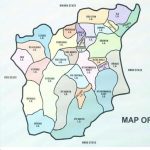US Bars Citizens From Travelling To 14 States In Nigeria


In its latest travel advisory, the United States has warned its citizens to avoid some 14 Nigerian states, rife with terrorism, banditry and kidnapping.
According to the advisory, the states and areas American visitors should avoid while in Nigeria are: Borno, Yobe, and northern Adamawa states due to terrorism and kidnapping, Bauchi, Gombe, Kaduna, Kano, Katsina, and Zamfara states due to kidnapping.
The State Department approved travel to other parts of the country, eventhough it urged its citizens to completely “Reconsider travel to Nigeria”.
It also banned American citizens from going to Coastal areas of Akwa Ibom, Bayelsa, Cross River, Delta, and Rivers states (with the exception of Port Harcourt) due to crime, kidnapping, and maritime crime.
In the country summary on Nigeria, the U.S. State Department wrote:
“Violent crime – such as armed robbery, assault, carjacking, kidnapping, hostage taking, banditry, and rape – is common throughout the country.
“Kidnappings for ransom occur frequently, often targeting dual national citizens who have returned to Nigeria for a visit, as well as U.S. citizens with perceived wealth. Kidnapping gangs have also stopped victims on interstate roads.
“Terrorists continue plotting and carrying out attacks in Nigeria, especially in the Northeast.
“Terrorists may attack with little or no warning, targeting shopping centers, malls, markets, hotels, places of worship, restaurants, bars, schools, government installations, transportation hubs, and other places where crowds gather. Terrorists are known to work with local gangs to expand their reach.
“There is civil unrest and low-level armed militancy in parts of Southern Nigeria, especially in the Niger Delta region. Armed criminality, including kidnapping and maritime crime, is also pervasive in this region.
“Violence can flare up between communities of farmers and herders in rural areas”.










